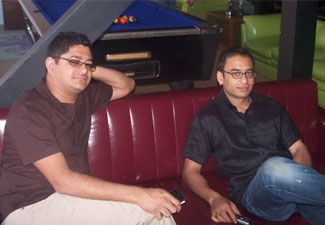
Blue Frog started life as a revolutionary Mumbai night club in December 2007. May 2008 saw the launch of three new music businesses from the founders - Blue Frog Production, Blue Frog Soundlabs and Blue Frog Records.
At a time when CD sales are declining and the number of record labels shutting down is on the rise, Blue Frog Records applies a more modern business philosophy in its approach. Ashutosh Phatak and Dhruv Ghanekar, the founding partners of the club share their insight on the new ventures with Radioandmusic.com's Abhimanyu Singh Phalke.
Excerpts:
After Blue Frog Club, what made you launch the other three ventures?
It was a natural progression. After the launch of our club, we had set our sights on bigger avenues and if you see, the synergies between the different businesses, it all makes sense. The production company offers backend support for proposals, the label puts the artiste and composers upfront and the club becomes a venue for the artiste to perform. Then we have the studios which give them a platform to record their work. So instead of them coming from outside, the artistes are coming through the club and we sign them on directly with our label. Then we also have artistes going outside to perform and that becomes a vehicle for the label to be recognised along with them. So it's all sort of synergised.
Why would your record label focus on less representative styles of music? Is there an audience for this?
Well exactly for that reason. The others are already well represented by the big labels. Yes, we do believe that there is an audience for this but it's not as big as we think. We have to start expanding the physical musicality of this city sensibly, as right now it's pretty one dimensional and it indicates Bollywood and remixes. There are lot of English speaking people in Mumbai and that should not mean that they shouldn't express themselves.
We are also targeting the NRI market which is looking back at the Indian market which has so much unheralded talent and scope. We also give non-mainstream artistes freedom of musical expression and offer the public a complete package of their favourite band. We organise tours and corporate gigs for label-signed artists and this is being noticed not just out here but on a international stage too. So the market is there but one has to get it out there for the masses to know. Not all of our music would connect with everyone. That's why we are varying it quite a bit and that's why call it "Genreless", which means it doesn't refer to a specific genre.
Are you just concentrating your label work within Mumbai?
Our label is going to have its presence all over India. Initially, we have tied up with Sony BMG for distribution, but then we shall take over this distribution in our way by getting our CDs into hotels, spas, coffee shops and malls.
Soon we shall have our music playing in every hotel room and that will open up a whole new channel to express our music nationwide. We are an independent label but with a solid professional backing. We want to take non-mainstream music and give it a platform because it deserves a wider audience.
How will the artistes benefit from your new ventures?
Essentially, the record label is a participation company more than a record label and what we do is propel the artiste into marketing based media and make videos for them. Soon, we would start making tours possible for them to perform all over India and with this, they would be ensured a platform to connect with the audience directly. As they get to travel more often, CD sales in stores would pick up and than we can start merchandising their stuff. We are also toying with the idea of using the artistes in jingles and in film placements. This way they get an overall exposure of our conceptual interface.
Are you also thinking of any more ventures?
We are thinking of new ventures for the long run. What we are doing now is looking into the picture and seeing what sense does it make five years or ten years from now and start implementing those ideas right away, instead of saying we have five more years to go.